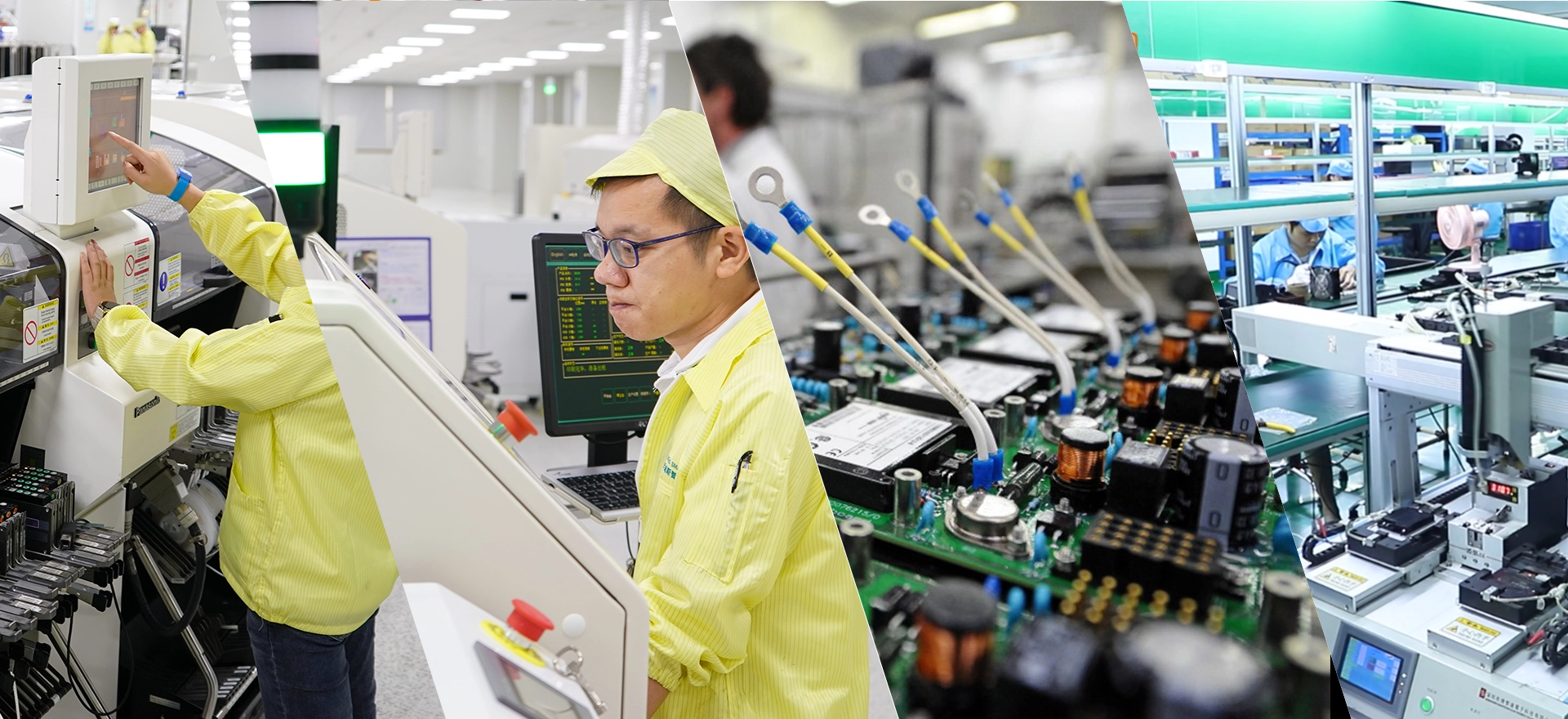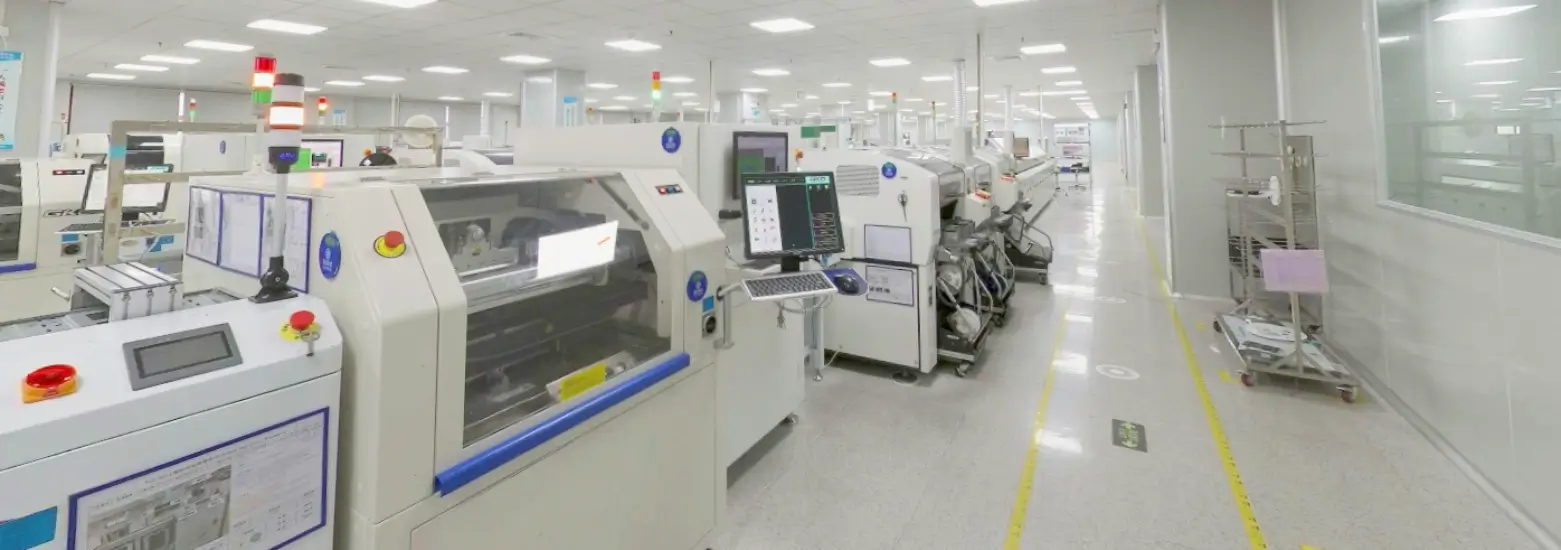PCBA Production Process
the Central Nervous System that Links Design with the Whole Device
With over 20 years of experience in PCBA manufacturing, our company provides professional, high-precision, and highly consistent PCBA solutions — from small-batch prototyping to large-scale mass production.
The Role of PCBA in the Electronics Manufacturing Process
The typical electronics manufacturing process is as follows:
Product Design → Engineering Verification (DFM/DFT) → Component Procurement → PCB Fabrication → PCBA Assembly → Testing & Verification (ICT/FCT) → Final Product Assembly → Quality Spot Check → Shipment
The PCBA assembly stage is the core link between ‘Engineering Verification’ and ‘Final Product Assembly,’ and it determines:
- Whether the circuit functions properly
- Whether the functional modules can operate in coordination
- Whether the subsequent final product assembly proceeds smoothly
- The stability and lifespan of the final product

PCBA Manufacturing Process
We offer full-process PCBA services, from single-layer and double-layer boards to multi-layer boards, mainly including the following steps:
1️⃣ SMT Assembly (Surface Mount Technology)
- Using fully automatic pick-and-place machines to accurately mount components such as resistors, capacitors, and IC chips onto the PCB surface.
- Employing reflow soldering to heat and weld the components, ensuring firm solder joints and reliable electrical connectivity.
- Inspection processes include SPI (Solder Paste Inspection), AOI (Automated Optical Inspection), and X-Ray solder joint inspection.

2️⃣ BGA Placement and Reflow Soldering
- BGA (Ball Grid Array) is a pinless package type that connects to the PCB only via an array of solder balls, suitable for high-density, high-performance chips such as MCUs, CPUs, and memory.
- We have professional BGA placement capabilities, paired with high-precision reflow ovens and temperature control systems to achieve reliable soldering.
- After BGA soldering, X-Ray inspection ensures all solder joints are uniform, with no open joints, bridges, or cold soldering.
- We also provide BGA rework and reballing services, significantly improving yield and repair capability.
 ① Wire bonding to the BGA chip; ② Flip-chip bonding to the BGA chip; ③ BGA PoP packaging
① Wire bonding to the BGA chip; ② Flip-chip bonding to the BGA chip; ③ BGA PoP packaging
3️⃣ DIP Through-Hole Assembly
- Used for large-size or special components, employing wave soldering or manual soldering methods.
- Supports lean manufacturing techniques such as custom soldering fixtures and intelligent workstation management.
4️⃣ Post-Solder Cleaning and Surface Treatment
- Professional cleaning solutions are used to remove solder residues, ensuring insulation and reliability of the PCB.
- Optional coatings for moisture, corrosion, and mold protection are available, suitable for outdoor or high-humidity environments.
5️⃣ Electrical and Functional Testing (ICT / FCT)
- ICT (In-Circuit Test): Checks solder joint connectivity, component values, and electrical characteristics.
- FCT (Functional Circuit Test): Simulates real product operation to verify that the main control, interfaces, and communication modules function reliably.
- Custom test fixtures and automated test scripts can be provided according to the customer’s circuit requirements.
Why is PCBA the Key to Electronics Manufacturing?
✅ Core Functionality:
Almost all product functions are determined by the PCBA — it serves as the “electronic brain.”
✅ Technology-Intensive:
Requires high-precision equipment and experienced engineers; the technical barrier is high.
✅ Wide Impact:
The quality of the PCBA directly affects whether final assembly proceeds smoothly and whether the product operates reliably.
✅ Complex Testing:
Multiple levels of electrical, functional, and reliability tests are performed to ensure zero-defect delivery.
Our PCBA Manufacturing Capabilities
- SMT Production Lines: 27 high-precision SMT lines, capable of handling 01005 ultra-small components and
irregular-shaped parts. - Inspection Equipment: Automated systems for AOI, X-Ray, SPI, and ICT/FCT testing.
- Process Compatibility: Supports leaded/lead-free soldering, mixed assembly, double-sided SMT, and flexible
PCBs.
Quality System and Certification Support
- Quality Certifications: ISO9001 / ISO13485 / ISO14001
- Process Control: Full-process quality management including IQC, IPQC, FQC, and OQC
- Market Access Support: Assistance with product certifications such as RoHS, CE, FCC, REACH, etc.





